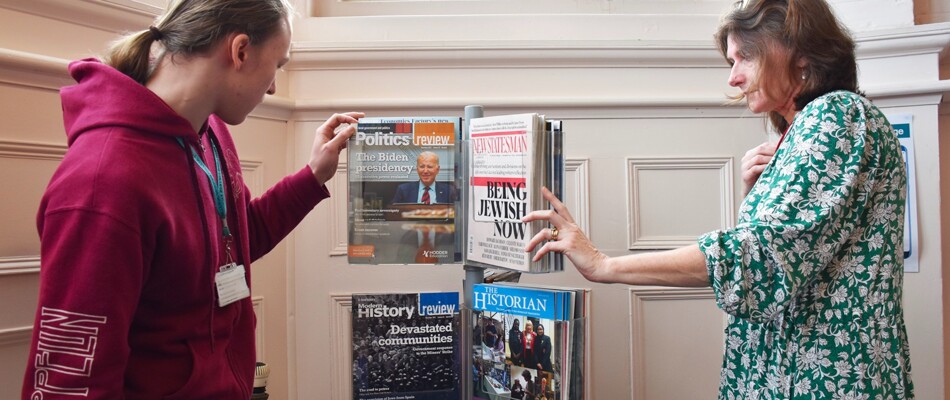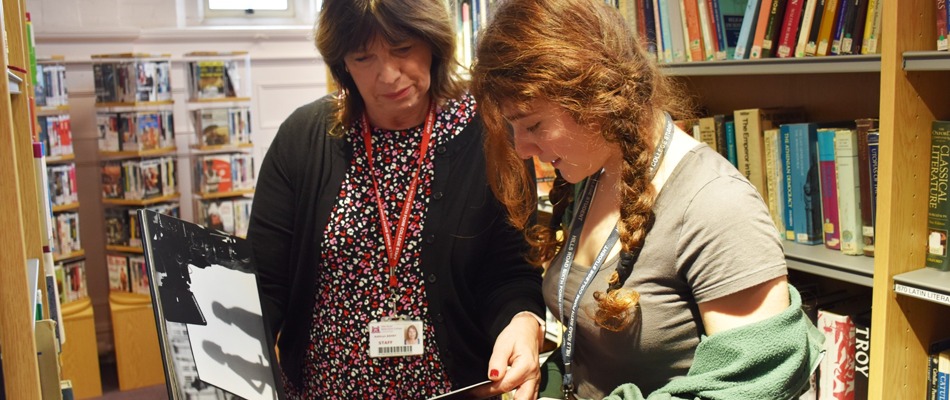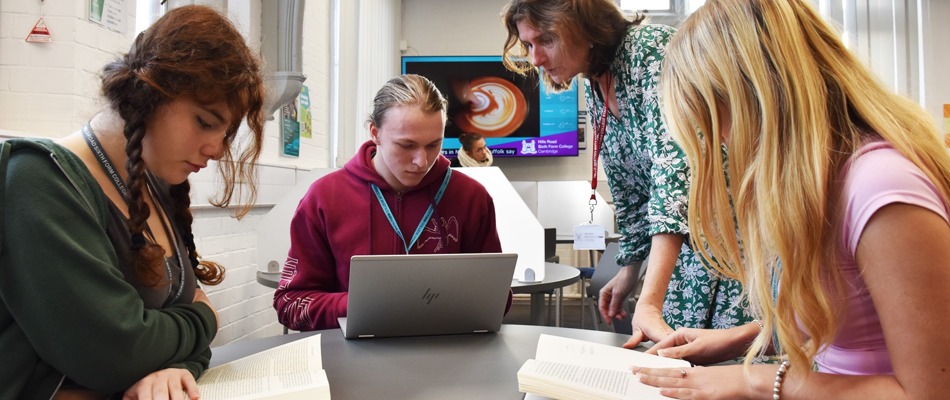Enhancing library engagement: a successful outreach initiative
Back
Hills Road Sixth Form College won the 2023 Independent Learning Award from SFCA for their library initiative. This article originally appeared in the CoLRiC Impact Newsletter #2 (January 2024), where the college was also showcased as a result of winning 2023's Highly Commended award from CoLRiC.
The COVID pandemic and associated remote learning unsurprisingly saw an unprecedented fall in the use of print and digital Library resources provided by our Library team. As we returned to a more normal education delivery we wanted to reengage students with the resources and services on offer, and help them to see the value of them.
The college had fully embedded digital learning across the curriculum post-pandemic with the use of Teams, Class Notebook, Office 365 and associated applications being standard practice. A new Library Portal (designed & developed by the Library Team) was launched in September 2021; despite our best efforts to promote this to students and staff, usage of both the platform and resources on offer remained stubbornly low.
Bring Your Own Device (BYOD) was launched in September 2022 with the new Year 12 cohort providing an excellent opportunity to engage students in physical Library use via a welcoming digital platform.
The project
Mindful that these cohorts had their own studies and education interrupted, and may not have engaged with their school Libraries to the extent that might have otherwise been the case, we knew we needed to carry out some outreach work with our students in a systematic way.
 The opportunity presented itself via the Extended Project Qualification, which is a compulsory part of the Year 12 Study Programme at Hills. The Library and Extended Project teams collaborated to design a “hands on” hour-long induction session for every Year 12 Extended Project group in their first half-term. This was delivered in the Library, to every extended project group, providing them with a complete overview of the range of both physical and digital resources available to them as part of their studies and comprised:
The opportunity presented itself via the Extended Project Qualification, which is a compulsory part of the Year 12 Study Programme at Hills. The Library and Extended Project teams collaborated to design a “hands on” hour-long induction session for every Year 12 Extended Project group in their first half-term. This was delivered in the Library, to every extended project group, providing them with a complete overview of the range of both physical and digital resources available to them as part of their studies and comprised:
- a comprehensive introduction to the Library Portal
- an overview of different paper and electronic resources available, including electronic journals, books, and media banks
- how to search the electronic resources successfully
- how to search the hard copy materials successfully via the online Library catalogue
- different types of research and how to judge their relevance, authority and quality
- time to browse the virtual/physical resources with support from Library & EP staff
With 58 groups to see, it was no small undertaking, with our Library and Digital Resources Manager and Assistant Manager delivering all these sessions between them across a period of 2 weeks in October 2022.
Measuring success
The programme has been enormously successful in re-engaging students with our Library and increasing our presence. We saw a doubling in the number of Year 12 Library users in the Autum Term of 2022 compared with the Year 12 cohort of the previous year, and the average number of items borrowed per user increased by 10%. The effect was not short lived either; we saw unique users continue to rise throughout 22/23 finishing with a 42% increase year on year and an increase in non-textbook borrowing of 34%. Early indications show that this cohort are continuing to use the Library in Year 13 with a 25% increase of unique users in the first half term of this year.
We are now exceeding our pre-pandemic levels of physical resource use by a small margin, but when we take into account how much of our provision has moved online in the last couple of years this represents a huge gain.
The winning formula?
We have spent some time reflecting on why this initiative worked where all other attempts had failed to achieve results, and this would be our checklist for anyone else thinking of embarking on such a project:
- Purposeful: the focus on EP rather than a generic induction gave us a gateway as a means of introducing students to all things Library
- Targeted: a homework task had been set by the EP team to find 5 pieces of initial research, one of which had to be Library related (physical or digital)
- Active: students were physically in the Library space, making a return visit easier as they knew where it was and what to expect. During the second half of the session they were required to log onto the portal and explore the catalogue & resources. They were asked to go and explore the library space, take books off shelves and browse for ideas. We all felt that whilst a classroom based session would have been easier logistically, it would not have had the same impact and buzz.
- Timely: this took place 3 to 4 weeks into term so students were not overwhelmed with information and had started to find their feet.
- Inclusive: an opportunity to engage across the entire cohort. From reluctant students who otherwise would be unlikely to be library users, through to those who may be too shy or nervous to come and ask for help.
- Friendly: the session gave us opportunities to fully interact with the students, for them to get to know us, use our knowledge and skills, and to appreciate the level of support and advice we could provide.
- Mindful: throughout the sessions we acknowledged and affirmed why they might not see a Library as relevant in the digital age. We reviewed the broad range of resources they might use as part of their research and demonstrated that we understood the challenges they faced setting out on such an open ended, independent research project, whilst emphasising the importance & benefits of using high quality academic materials.
The Library Portal
The Library Portal was a pivotal tool in the delivery of these sessions. It was developed by Library Staff, in SharePoint, to fulfil a number of goals:
- Create a single point of access for all things Library
- Streamline user access and library management of digital resources
- Showcase the breadth of resources available to encourage wider use
- Attractive visual interface that adapts dynamically on Smart Phones
For a brief overview you are welcome to take our Library Portal Tour.
Whilst it has been invaluable for the delivery of the EP sessions we have seen many other benefits:
- Reduction in the number of access issues/queries for digital resources. Staff and students know that they must always use the links via the Portal and never bookmark or share links to ensure that log in details are always up to date and that the “single sign in” will function correctly
- We have been able to utitlise the “News” functionality of SharePoint to share important information, events, promotions or blogs which we have shared via email with visual thumbnail links. This allows us to monitor engagement with the material as we can see how much the page has been visited.
- Improved self-management of student Library accounts (independent renewals, reservations & reduction in overdue items)
It is particularly gratifying to see students looking for items in the Library with the catalogue open on their phones, accessed via the portal.
We are not sure how we used to function without it!
Next steps
We delivered the programme again this academic year, tweaking the provision to include references to ChatGPT/AI generated material, emphasising the need to reflect and question sources, encouraging academic curiosity. 
We also rapidly became aware that this cohort were not as creative, resilient or determined as previous year groups in their search for information. If a search of the materials did not elicit any results there was an assumption that those materials did not exist (e.g., a search for “death penalty” in the library catalogue returned nothing, but “capital punishment” did).
We are reluctant to attribute this all to the interruptions to education due to Covid, but instead suspect it is more to do with how “clever” search engines such as Google have become, providing almost instant gratification, and how lacking some academic search tools are in comparison. There has been more emphasis this year on coaching students on the fine art of getting the best out of resources.
We have seen a similar level of physical Library use with the Year 12s this year to last (so far), but of course we are not satisfied with that! So we will strive to continue to come up with new and inventive ways to promote the relevance, importance and joy of Libraries.
Look out for more blogs from award winners in the coming weeks; you can find the first in the series here.

